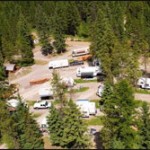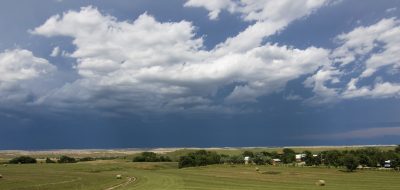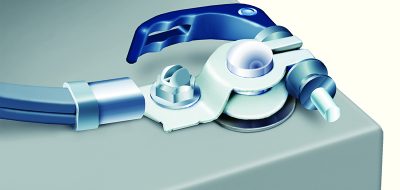Dear Gary,
I watched one of your television shows where the family of a hybrid trailer needed a stronger battery. You replaced their 12-volt battery with two 6-volt batteries. I have a 26-foot RV and it has only one 12-volt battery. Would it be better for me to use two 6-volts? Would I get more amps with two12-volt batteries instead? I also have a converter but no inverter in my trailer. If I pull into a campground or parking lot where I need to run off battery, the lights work but the outlets do not. How would I install an inverter into my trailer and how hard would it be?
– John Okragleski, (no city/state)
Answer:
 John, to replace your battery depends on the size (capacity) you have now. On RV Roadtrips, I replaced a group 27, 12-volt battery with two, 6-volt batteries. In that case the single group 27 was rated at about 105 amps. The two 6-volt batteries were rated at 225 amps. So even by adding a second group 27 battery, (105 + 105 = 210 amps), the two 6-volts in series had the larger storage capability. Plus they were true deep cycle batteries which is my preference.
John, to replace your battery depends on the size (capacity) you have now. On RV Roadtrips, I replaced a group 27, 12-volt battery with two, 6-volt batteries. In that case the single group 27 was rated at about 105 amps. The two 6-volt batteries were rated at 225 amps. So even by adding a second group 27 battery, (105 + 105 = 210 amps), the two 6-volts in series had the larger storage capability. Plus they were true deep cycle batteries which is my preference.
So it comes down to a matter of doing the math. And that starts by determining the size and rating of your existing battery. As for your interior receptacles, they are 120-volt AC only. All the lamps are 12-volt DC powered. For the receptacles to be hot, you’ll need either a generator or an inverter. An inverter, however, requires a very large battery bank which will quickly be drained by using high current devices.
Inverters are relatively easy to install; no problem for the average handyman. Just be sure you have enough battery power. Batteries, generators, and inverters all should be “sized” according to the application. Sizing charts are easily found on the Web or check out a copy of my RV Owner’s Handbook. I would suggest a small, true sine-wave inverter wired to a dedicated receptacle in order to conserve battery power rather than a larger unit to power every circuit.
(Please feel free to comment, however, please also note that due to the volume of communications I receive from multiple channels I cannot guarantee a personal response in every instance. However, questions of an overall general interest may be considered and published in an upcoming RV Doctor column.)






steven
i own a food truck with a refrigerator and a prep table. i also have a 40 watt inverter that is suppose to run 2 outside lights, that dont work.by having the right inverter would i be able to run the frdge and prep table on battery power alone
walter
I need to replace the electric motor in my one step awning also the torquesion bar. Can you tell how the torquesion bar is to be replace?
Where is the danger and what are the pro and con of doing it myself?
Walter
bill moses
Have a problem with dimming and surging when connected to shore power.
The heater and he lights will be dim one minute and then surge and be real bright the next. What could be causing this; what can I look for and is it something I can or should even attempt, to fix.
William Moses
Walpoe, NH
Chip
I don’t know anything about trailering, but an inverter allows me to use the TV and games for the kids while driving without putting a ton of hours on the generator. And since the coach is running, it’s free power!
Fred Brandeberry, SR
Hi Guys and Gals:
I think the greatest value of an inverter, is being able to run the refrigerator while traveling, and not have the hazards connected to LP use.
Happy Camping,
Fred b.
Jack graham
Inverters !
I have 2 … (a 75 watt & 200 watt) Both plug into the cigar outlet that feeds from the motor battery. That worries me. I would rather mooch off the coach batteries ( 3 deep cycle 12 V). All I anticipate using them for is to recharge my laptop or small family radio/walkie-talkies, or maybe run a small fan for a few hours. Would this pose a risk to my motor battery ? I don’t think the coach batteries are really suitable to jump-start a V-10 ! Getting an RV tech to hard-wire an outlet from the coach batteries would be somewhat expensive .
Kyle
I think every RV owner should install an inverter in their RV. It comes in handy when your dry camping
Casey Donovan
Your response is about as good as can be made briefly to someone with little electrical knowledge. However, is it possible that the correspondent is overlooking the fact that all but the most primitive campgrounds have some 120 volt AC service that he can plug into?
Also, I question the recommendation for installing a true sine wave inverter given no indication he intends to power anything requiring such an expensive power supply. Most newer laptops and small TV’s are happy enough with AC power from a decent modified sine wave inverter costing much less.
John
I went through this exercise in an attempt to extend my “dry camping” stay without running a generator very often. After looking at all the options I decided that the group 27 batteries in parallel were a better fit for me. I looked at the amp hours that were available for various combinations and ran into the acceptable “charge rate” problems for the true deep cycle batteries. Although it was sometime ago I seem to remember that it was on the order of 5 amps charging current to charge them. That would result in a recharge time that was not acceptable to me. From the info that I gathered it appeared that they would not accept the charge rate of the typical battery sold at the RV stores. Charging them at a higher rate would not serve them well and the slower rates took too long to be useful for me. Perhaps I missed something in the drill, but I opted to two or three group 27 batteries in parallel and so far it seems to be a good choice.